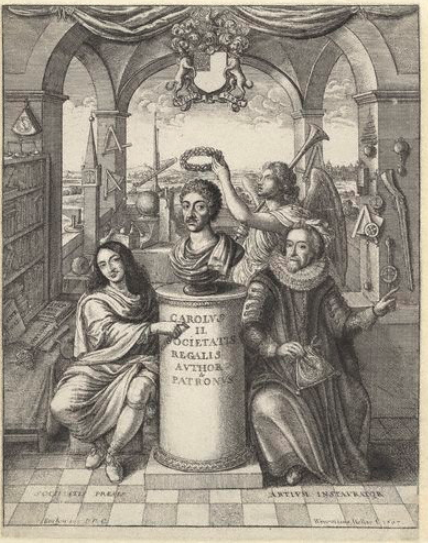"scientia potentia est" was written for the first time in the 1668 version of the work LeviathanOffsite Link by Thomas Hobbes
https://www.historyofinformation.com/detail.php?id=5253
In His "Meditationes Sacrae" Francis Bacon Writes "Ipsa Scientia Potestas Est" (Knowledge is Power)
1597 to 1668Frontispiece by Wenceslaus Hollar of Sprat's History of the Royal-Society (1667) depicting Bacon in the foreground on the right as one of the founding influences of the Society.The expression, "knowlege is power," traditionally attributed to Sir Francis Bacon , is not literally what Bacon wrote. According to the Wikipedia article, Scientia potentia est
, is not literally what Bacon wrote. According to the Wikipedia article, Scientia potentia est , the closest thing that Bacon wrote to the Latin phrase was "statuuntque latiores terminos scientiae Dei quam potestatis, vel potius ejus partis potestatis Dei (nam et ipsa scientia potestas est) qua scit, quam ejus qua movet et agit: ut praesciat quaedam otiose, quae non praedestinet et praeordinet," in his Meditationes sacrae
, the closest thing that Bacon wrote to the Latin phrase was "statuuntque latiores terminos scientiae Dei quam potestatis, vel potius ejus partis potestatis Dei (nam et ipsa scientia potestas est) qua scit, quam ejus qua movet et agit: ut praesciat quaedam otiose, quae non praedestinet et praeordinet," in his Meditationes sacrae  (1597. This phrase was translated as:
(1597. This phrase was translated as:
"The sciences are small powers; because not eminent, and therefore, not acknowledged in any man; nor are at all, but in a few, and in them, but of a few things. For science is of that nature, as none can understand it to be, but such as in a good measure have attained it".
The writers of the Wikipedia article indicated that the exact phrase "scientia potentia est" was written for the first time in the 1668 version of the work Leviathan by Thomas Hobbes
by Thomas Hobbes , who was a secretary to Bacon as a young man.
, who was a secretary to Bacon as a young man.
As the phrase was adapted over the centuries, by the early 19th century, Hobbes' version of the phrase was widely attributed to Bacon. We find it used for the promotion of the practical value of learning or the learning of information useful in life by the Society for the Diffusion of Useful Knowledge and the related Mechanic's Magazine. Later the phrase was misused in the sense of government surveillance by the shortlived U.S. government "Information Awareness Office."
Frontispiece by Wenceslaus Hollar of Sprat's History of the Royal-Society (1667) depicting Bacon in the foreground on the right as one of the founding influences of the Society.
"The sciences are small powers; because not eminent, and therefore, not acknowledged in any man; nor are at all, but in a few, and in them, but of a few things. For science is of that nature, as none can understand it to be, but such as in a good measure have attained it".
The writers of the Wikipedia article indicated that the exact phrase "scientia potentia est" was written for the first time in the 1668 version of the work Leviathan
As the phrase was adapted over the centuries, by the early 19th century, Hobbes' version of the phrase was widely attributed to Bacon. We find it used for the promotion of the practical value of learning or the learning of information useful in life by the Society for the Diffusion of Useful Knowledge and the related Mechanic's Magazine. Later the phrase was misused in the sense of government surveillance by the shortlived U.S. government "Information Awareness Office."

Comments